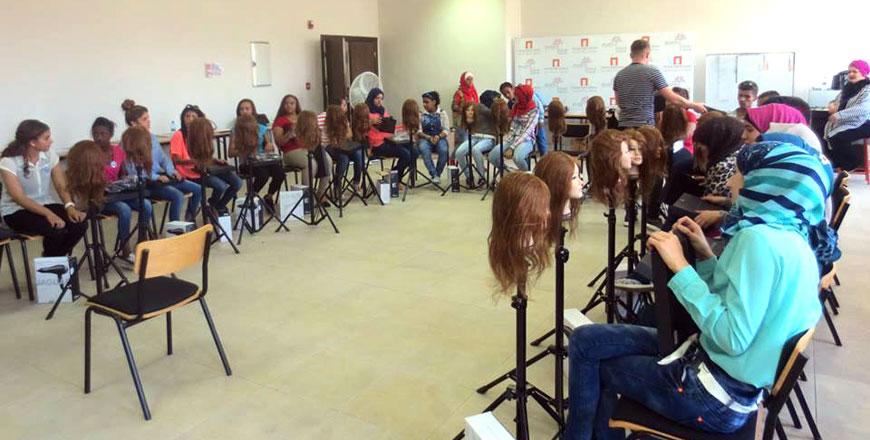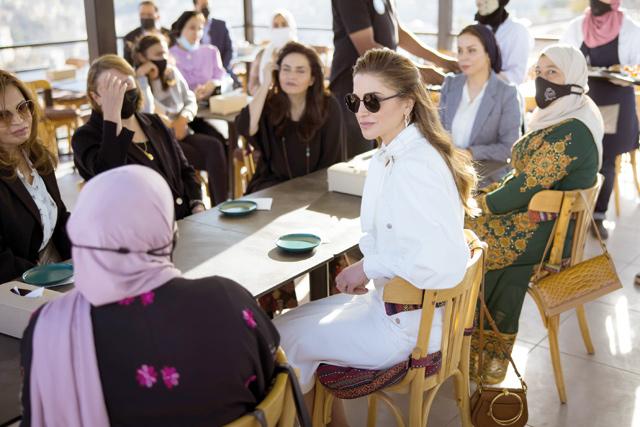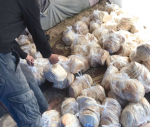You are here
Orphaned women build new future through local NGO
By Camille Dupire - Nov 16,2017 - Last updated at Nov 16,2017

The Princess Taghrid Institute provides vocational training for young women over 18 in the beauty, health and food industries, among others (Photo courtesy of HRH Princess Taghrid Institute)
AMMAN — A shelter aimed at hosting orphaned young women aged 18 years and older is scheduled to be opened next month, Director of the HRH Princess Taghrid Institute (PTI) Aghadeer Jweihan told The Jordan Times.
“We have signed a contract with the Ministry of Social Development to provide a safe and secure after-care accommodation for women after 18, who often end up in dangerous situations once they leave governmental shelters,” she said, noting that the official inauguration is expected to take place in January.
She added that His Majesty King Abdullah provided PTI with the building and funding for the project.
“Once they reach 18, these women suffer much from the ‘psychological stigma’ imposed by society,” Jweihan, who founded the institute eight years ago, said, adding: “this is a great challenge compared to the situation of younger orphans whom people empathise with.”
Stressing the weight of paternal affiliation in the Jordanian culture, she said: “One of the first questions asked in our society is ‘what is your father, your grandfather’s name?’. Because they cannot answer, these girls are immediately treated like criminals, paying for the crime that their parents committed.”
In partnership with the Ministry of Social Development and local organisations like the Amman Fund, SOS Villages Jordan, PTI works to rehabilitate, train, integrate and employ orphaned and abandoned youth above the age of 18.
“The most important thing I teach my girls [Jweihan has been personally involved with each one of the beneficiaries] is to work on themselves, to earn the respect they deserve,” the director said, noting that she warns them against adopting a begging mindset or accepting any kind of donation.
“These women are normal human beings; they do not need clothes or pity. They just need to be empowered to earn the respect and acceptance of society through their own efforts,” she told The Jordan Times at the institute.
PTI provides two-fold training to the young women: a psychological and self-help programme, which helps them “regain a sense of dignity and self worth”, and a vocational training to empower them professionally and economically.
“We collaborate with the Ministry of Social Development, which brings young women in need of support from all over Jordan, and we partner with various local organisations,” the director said, commending HRH Princess Taghrid’s continuous support to the initiative.
Young ladies from partner organisations, like SOS Villages Jordan benefit from vocational training offered by PTI.
“We have some very successful girls working in hair salons, one who started her own jewelry line, all of which could have never happened without the training provided at the institute,” Reem Habayeb, chairman of SOS Villages told The Jordan Times.
“In line with what I teach my girls, I wanted the institute to be self-sustainable. We therefore developed tailor shops, salons, and rented our halls, in order to generate an income for our projects,” she said.
Most of the girls working at the institute are former beneficiaries of the programme, like Nada, a 24-year-old working in the financial department while studying to earn the Tawjihi (high school certificate) she never had the chance to pass.
“She is an amazing role model,” said Jweihan, referring to Nada’s journey from a governmental shelter to her vocational training at the Intercontinental Hotel and her current position.
“She has been with us for 8 years and I didn’t want her to go in any other jobs because she is such an example for others; she has ambition and determination that show the other girls that everything can be achieved,” the director said.
Admitting that she has become emotionally involved with PTI, Jweihan said: “I tell all these girls ‘I am Dr Aghadeer in the morning, and your mother in the afternoon’.”
“More than anything to succeed in life, they need a sense of belonging, to feel like they are part of a family, whether it is their biological one or not,” she concluded.
Related Articles
AMMAN — Her Majesty Queen Rania visited Dar Ne’meh gift shop and café at the Amman Citadel on Monday, a project run by the Princess Taghrid
AMMAN — The Vocational Training Corporation (VTC) and the Princess Taghrid Institute for Development and Training (PTI) on Wednesday signed
AMMAN — The Princess Taghrid Institute for Development and Training (PTI) on Sunday signed a cooperation agreement with The Global Craftsmen















